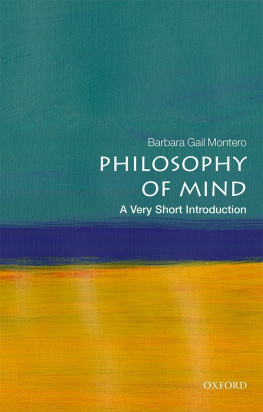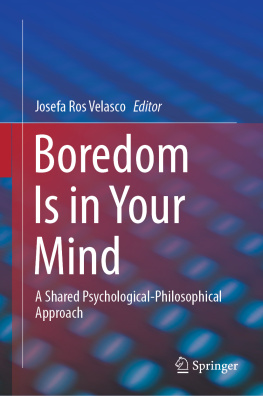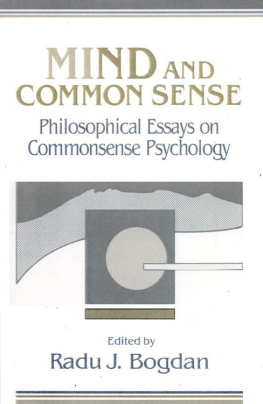
Corazza, Eros , Department of PhilosophyUniversity of Nottingham
Reflecting the Mind
Indexicality and Quasi-Indexicality
Publication date 2004 (this edition)
Print ISBN-10: 0-19-927018-X
Print ISBN-13: 978-0-19-927018-7
doi:10.1093/019927018X.001.0001
Abstract: Indexicals (e.g.: 'I', 'she', 'this', 'today', 'here', etc.) designate something relative to the context in which they are used. This study shows how these expressions play a central role when dealing with such puzzling concepts as the nature of the self, the nature of perception, social interaction, psychological pathologies and psychological development.By highlighting how indexical thoughts are irreducible and intrinsically perspectival, this inquiry shows how we can depict someone else's indexical thought from a third person perspective. To do so, the phenomenon of quasi-indexicality plays a central role: to represent Jane saying, 'I am prosperous', we use what Castaeda termed a quasi-indicatorin a report of the form 'Jane said that she (herself)is prosperous'. It is argued that quasi-indicators play such an important role in our linguistic, social, and psychological life that they have a cognitive primacy over other mechanisms of reference. It emerges that quasi-indexicality is also a key notion when we cope to understand our mindreading capacity.Ultimately, this interdisciplinary approach recommends the view that indexicality and quasi-indexicality are two sides of the same coin. It is argued that indexicality and quasi-indexicality are best understood within the framework of direct reference, conceived from a Wittgenstein-inspired perspective.
Keywords: anaphora,cognition,context,indexicals,logophoric pronouns,pronouns,propositional attitudes,psychological pathologies,quasi-indicators,reference
Reflecting the Mind
end p.i
end p.ii
Reflecting the Mind
Indexicality and Quasi-Indexicality
end p.iii

Great Clarendon Street, Oxford ox 2 6 dp
Oxford University Press is a department of the University of Oxford.
It furthers the University's objective of excellence in research, scholarship,
and education by publishing worldwide in
Oxford New York
Auckland Bangkok Buenos Aires Cape Town Chennai
Dar es Salaam Delhi Hong Kong Istanbul Karachi Kolkata
Kuala Lumpur Madrid Melbourne Mexico City Mumbai Nairobi
So Paulo Shanghai Taipei Tokyo Toronto
Oxford is a registered trade mark of Oxford University Press
in the UK and in certain other countries
Published in the United States
by Oxford University Press Inc., New York
Eros Corazza 2004
The moral rights of the author have been asserted
Database right Oxford University Press (maker)
First published 2004
All rights reserved. No part of this publication may be reproduced,
stored in a retrieval system, or transmitted, in any form or by any means,
without the prior permission in writing of Oxford University Press,
or as expressly permitted by law, or under terms agreed with the appropriate
reprographics rights organization. Enquiries concerning reproduction
outside the scope of the above should be sent to the Rights Department,
Oxford University Press, at the address above
You must not circulate this book in any other binding or cover
and you must impose this same condition on any acquirer
British Library Cataloguing in Publication Data
Data available
Library of Congress Cataloging in Publication Data
Data available
ISBN 0-19-927018-X
1 3 5 7 9 10 8 6 4 2
end p.iv
Preface
I began thinking about indexicality and related issues in 1988 when, as a Fulbright student, I met Hector-Neri Castaeda. Castaeda has been a constant inspiration. He taught me that one cannot fully appreciate the phenomenon of indexicality if one does not also focus on quasi-indexicality. It took me a moment to appreciate this idea, but I am now convinced that he was right. I hope that I am capable of showing why in what follows. I like to remember the lively discussions I had with Castaeda and I often wonder what he would think about my direct-reference approach to indexicality and quasi-indexicality and what illuminating criticisms he would come out with.
My Wittgensteinian influence comes from my undergraduate studies at the University of Geneva, where I had the opportunity to be taught by Jacques Bouveresse. Whilst there, I benefited from being taught by (and having discussions with) Curzio Chiesa, Richard Glauser, Jean-Pierre Leyvraz, and Kevin Mulligan. Bouveresse and Mulligan also supervised my Ph.D. dissertation, which constituted the basis of my Rfrence, contexte et attitude book published in 1995 by Vrin-Bellarmin. I also began a long-term friendship with Jrme Dokic in Geneva, with whom I have since spent a great deal of time discussing philosophy and other, more important things.
During my Ph.D. period I had the chance to meet John Perry. His influence and friendship crystallized between 1992 and 1995 when, as a post.-doc., I visited CSLI. My CSLI experience has been positive in many ways. As well as meeting some very bright people I found myself in a friendly atmosphere. I also owe the title of this book to Perry: it was his suggestion that I should write a monograph on quasi-indexicality and that I should call it Reflecting the Mind, which triggered the writing of this book. It will be obvious to anyone who knows Perry's work that his influence on me has been both profound and extensive.
During my stay in California, I also came to know Stefano Predelli and Howard Wettstein. The discussion and correspondence I have had with both of them on indexicality and related topics since then has been inspiring. Stefano Predelli, Jrme Dokic, and Mark Whitsey read a penultimate version of this book and gave me many valuable comments. Discussion and correspondence with Franois Recanati has also been influential over the last few years. Pierre Jacob, Elisabeth Pacherie, and Jolle Proust have been instrumental in directing me to relevant
end p.vi
studies in the cognitive sciences. The friendly atmosphere and intellectual surroundings of the Jean-Nicod Institute, which I have had the chance to visit several times over the last few years, has always been refreshing and inspirational. I can hardly imagine a place where one's research can be conducted in such a friendly and intellectually challenging atmosphere.
Many other people have provided me with comments and suggestions during the preparation and writing of this book and I am sure I have forgetten many of them, but I will nonetheless supply the following list of people whom I wish to thank: F. Adams, J. Almog, K. Bach, S. Barker, J. Biro, R. Black, D. Bodrozic, E. Borg, B. Carr, R. Carston, R. Casati, M. Clark, F. Correia, G. Currie, K. Donnellan, F. Dretzke, W. Fish, J. Ganeri, J. Gorvett, N. Jones, D. Kaplan, P. Keller, J. Ketland, J. King, B. Kirk, E. LePore, B. Loar, D. Marconi, G. Marti, A. Mercier, S. Mumford, P. Noordhof, A. Palma, J. Pelletier, M. Popa, N. Salmon, G. Segal, G.-F. Soldati, C. Swain, R. Valle, A. Voltolini, and T. Wilkerson.
I should also mention the audiences to whom previous versions of the papers which form the basis of several chapters were presented during the last six or seven years. Comments by referees for journals to which these papers were submitted have also been valuable. Some of the material has also been presented in my philosophy of language class at the University of Nottingham in 2001-2 and in a twenty-four-hour seminar I conducted at the University of Fribourg in Spring 2003Gian Franco Soldati and Davor Bodrozic merit a special mention for their incisive and friendly comments during that seminar. During my teaching experience I have had the chance to encounter many bright students whose questions have helped in clarifying many points and ideas. Needless to say, the remaining mistakes are entirely my responsibility.











